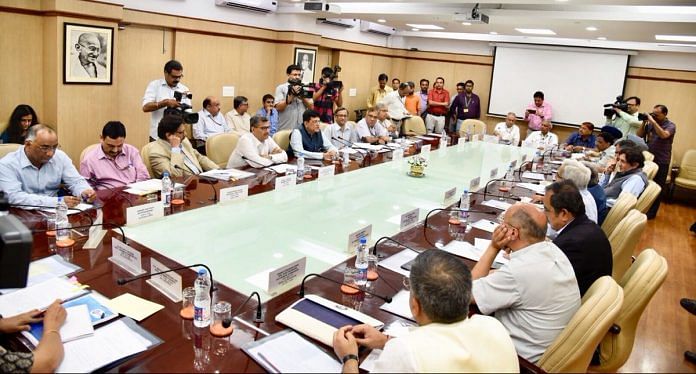States want their share of funds from central pool to be raised to 50% from 42%.
New Delhi: The 15th Finance Commission has assured the states that their old demands and complaints over central funds will be addressed but the states now want more money.
Sources told ThePrint that most state governments have underlined the need to increase their share in the Centre’s divisible pool to about 50 per cent from the current 42 per cent.
While the commission is yet to address the new demand, it has assured state governments that it will carve out its own interpretations within the parameters of the set terms to ensure that none have reasons to complain about the concerns that have already been raised such as the differentiation between states based on their population.
“The Centre must ensure that more funds are available to the states…in reality, states are getting a lesser share. The allocation towards various social welfare schemes has also come down, affecting the states’ health in turn,” West Bengal finance minister Amit Mitra said.
In 2015, the Centre accepted the recommendations of the 14th Finance Commission and increased the share of the divisible pool to 42 per cent from 32 per cent. The Centre’s divisible pool of taxes has, however, actually shrunk due to a rise in the share of surcharge and cesses, which can be used only for purposes specified and are not devolved to states.
“While the finance commission cannot delve into surcharges or cesses as it is outside its ambit, it should increase the share for the states. States need to carry out the on-ground development work so they need the money,” Shaibal Gupta, founder member-secretary of the Asian Development Research Institute in Patna told the Print.
The finance commissions chalk out financial relations between Centre and states. The recommendations of the current commission will be applicable for a period of five years from 1 April, 2020.
Terms of Reference a sticky issue
The Terms of Reference (ToR) for the 15th finance commission take into consideration the 2011 census for arriving at population weightage for devolution of central funds.
Earlier, the practice was based on the 1971 census. Many states, particularly the southern ones, had protested saying that they would significantly lose out if the ToR were adhered to.
Sources, however, said that nothing was cast in stone and that the finance commission had the liberty to interpret it the way it thinks is best suited for the states.
“While the finance commission cannot tamper with the ToR, it is likely to find ways to skirt the ToR and chalk out a formula that will be acceptable to all states,” a source familiar with the development said.
After the ToR were set, fingers have been pointed at the Centre and several state government officials said that they have been structured in a manner that would help the BJP-ruled states more than others.
Earlier, NITI Aayog CEO Amitabh Kant had sparked a controversy with his comments that a few states such as Bihar and Uttar Pradesh were holding back overall development in the country.




Public finances for both Centre and states are under considerable strain, notwithstanding a bonanza of about ten trillion from oil. Their borrowing costs have risen to about 8 and 8.5 %, respectively. Several states, Karnataka most recently, have announced farm loan waivers, with a cumulative total of about two trillion. So the Centre may not be in a position to raise their share from 42 to 50 %. However, the decision to use 2011 census figures should be dropped. It privileges the cow belt which, as Shri Kant points out, is holding the more progressive parts of India back.